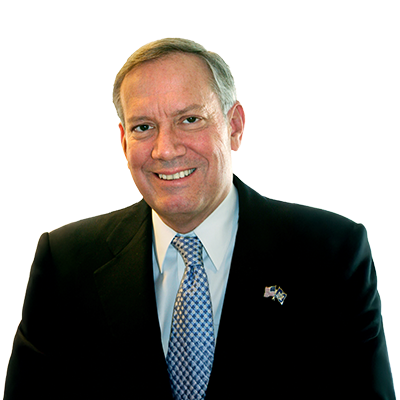Senior Counsel and former New York Governor George Pataki works to provide displaced Ukrainians with shelter and power as the war drags on
Pataki bringing heating units and generators on his latest trip to Western Ukraine, part of ongoing humanitarian relief efforts by the Pataki Leadership Center
United States | Press release - People | December 2022
As winter closes in and Russian attacks continue to hammer Ukraine's energy infrastructure, Norton Rose Fulbright senior counsel and former New York Governor George E. Pataki is bringing portable heating units to Ukraine to aid displaced families. It is the latest humanitarian relief effort by Pataki through his nonprofit Pataki Leadership Center, which has delivered more than 150 tons of food, housing, hygiene and medical supplies to Ukraine since the organization's first mission in March 2022.
The units will help address what Pataki, speaking at a recent conference at Norton Rose Fulbright's New York office, said is the most urgent issue right now: providing shelter and power to roughly 6.5 million internally displaced Ukrainians who will face "brutally difficult" conditions this winter.
"The Russian attacks have largely destroyed the heating and power infrastructure. We need generators and heating units," said Pataki, who returned to Ukraine in early December to help distribute the aid. "Our center is buying 1,000 self-contained portable heating units that don't need electricity or fuel. We've delivered 15 industrial-sized heaters that can provide heat for up to 100,000 displaced Ukrainians. Another 200 heaters and 100 generators are on the way."
Ukrainian officials say Moscow is targeting energy facilities and other infrastructure with missile and drone attacks—which have also killed civilians—in a bid to erode popular support for the war as Russian forces lose ground. The attacks have led to rolling blackouts and government appeals for Ukrainians to cut back energy consumption. Analysts warn that grid failures could increase the flow of refugees and imperil millions of Ukrainians heading into the winter months.
Pataki said he is disappointed to have seen so few signs of Western humanitarian aid on the ground inside Ukraine. "I have a very small charity and what we're doing is so little—it's a drop in the bucket compared to what they need," he said before the trip. "Every time we go—and this will be the fifth trip—we hope to see massive amounts of US or Red Cross or other humanitarian aid. Hopefully, we'll see it on this trip."
Pataki has family roots in the region, and has made several trips to Ukraine since the war began to meet with officials and funnel aid to Ukrainians forced from their homes by the war. The Center has established a humanitarian aid office on the ground in Western Ukraine, near the border with Hungary, and has partnered with a Hungarian manufacturing company to create dozens of modular homes for displaced Ukrainians—though hundreds of thousands more are needed.
"My grandparents' village is about five miles from the Ukrainian border, on the Hungarian side,"
Pataki said. "Shortly after the war started, we went over, through the Pataki Center, to get a sense of what was happening and see if we could provide some help. We took food, we took medical supplies and we met with both refugees and government officials. And I was absolutely stunned at the spirit of the Ukrainian people."
"We'd go to a school where displaced people from Eastern Ukraine were living—women with young children, sleeping on floors," he said. "They left everything behind, but they never asked for anything for themselves. They always said, 'We need military aid to win the war. My husband is back at the front fighting, my brother's there, my son.'"
For more information on the Pataki Leadership Center or to make a donation, visit www.georgepatakicenter.com/ukraine.

